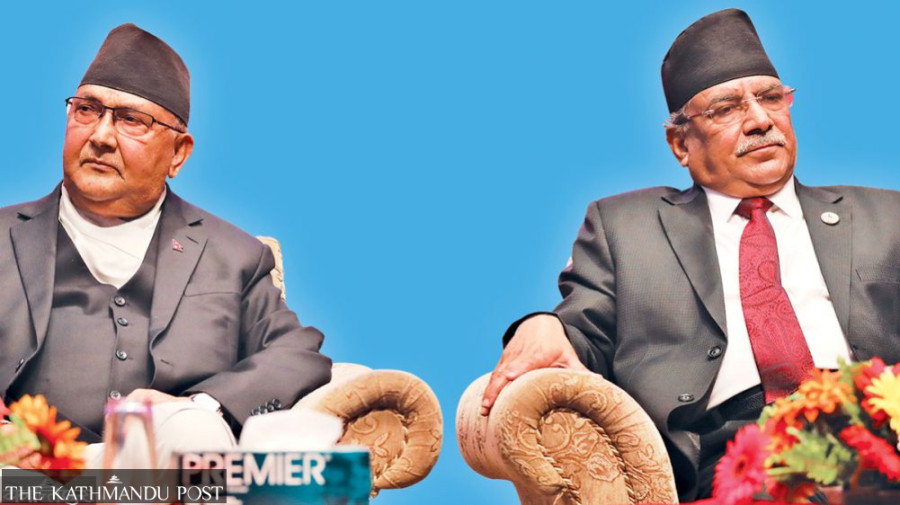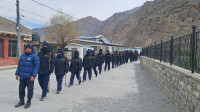Politics
UML-Maoist war of words continues to escalate
Leaders from both parties are using incendiary rhetoric against each other, divided on issues including narrative of Maoist insurgency and constitutional amendment.
Post Report
The verbal war between the country’s two big communist forces—CPN-UML and CPN (Maoist Centre)—continues to escalate with leaders from both parties targeting each other in different forums.
The Maoist Centre got agitated after the UML pulled out its support to the government led by Pushpa Kamal Dahal, the Maoist chief, in the second week of July.
The series of attacks and counter-attacks against each other is unlikely to stop anytime soon, leaders from both sides say.
Prime Minister and UML chief KP Sharma Oli has warned the Maoist Centre to stop glamorising the violence it committed during the decade-long insurgency. He urged the Maoist leadership to stop glorifying such violence and asked them to be part of national development.
The verbal war between the leaders of Oli’s party and the Maoist Centre intensified after lawmaker and UML Secretary Yogesh Bhattarai said in Parliament that the decade-long war waged by the Maoists against the state was “unfortunate”. In the House session on August 28, Bhattarai repeatedly termed the Maoist insurgency “violence”.
“If the Maoist war was great, why did they abandon it?” Oli said days later. “Why did they join the peace process? If people’s war was great then it should have been successful but it was not. Later the peaceful movement became successful.”
In one speech in Parliament, former prime minister Dahal warned that the fate of Nepali leaders could be similar to those of the ruling party leaders in Bangladesh as the recent incidents show and in Sri Lanka two years ago.
Dahal went on to say that if the governing alliance of the Nepali Congress and the UML fails to address public aspirations, Nepal could face situations like in the two other South Asian nations.
“You, not me, should learn from a lesson from Bangladesh,” Oli said, responding to Dahal, at an event on August 31. “Just yesterday, Prachanda ji [Dahal] reportedly advised me to learn lessons from Bangladesh and Sri Lanka. But have I killed 17,000 people so I would tremble with fear? Have I robbed the people?”
Oli continued, “I do not need to fear anyone. It is Dahal who must learn from Sri Lanka and Bangladesh.”
Oli also ruled out the possibility of Nepal becoming the next Sri Lanka or Bangladesh as Nepal’s history and tradition are different from those of the South Asian neighbours.
At a function organised in Tundikhel on August 26 to mark Gaura Parva, some youths chanted slogans against Oli and Congress President Sher Bahadur Deuba. That caused worries among Nepali leaders and analysts that growing frustration among the Nepali youths could lead to a political disaster in Nepal.
The growing rift between the UML and the Maoist Centre has been discussed in both the parties. The two communist forces formed an alliance ahead of the parliamentary elections in 2017. The next year, they merged to become the largest party and governed the country for three years.
But the unity between the UML and the Maoist Centre did not last long. A Supreme Court verdict split them in May 2021, ruling that the unified party’s name was illegal.
Even after the 2022 elections, Oli and Dahal teamed up twice to run the government but their coalitions were not successful.
“After our decision to contest the elections independently, Maoist comrades seem to have become more aggressive towards us,” a senior UML leader said. “Without our or the Nepali Congress’s support, the Maoist Centre is unlikely to retain the national party status after the next elections.”
A recent politburo meeting of the UML concluded that the possibility of unity or alliance among leftist parties had been over. On the other hand, the Congress, which joined forces with the Maoist Centre and other parties during the last elections, has also decided to contest the elections single-handedly. “The decisions of the Nepali Congress and the UML to contest the elections on their own have come as big shocks for the Maoist Centre. So they are venting ire against us,” the UML leader said.
Meanwhile, the Maoist Centre has issued a circular to its rank and file to be ready for street protests. The internal communication in the Maoist Centre has further irked the UML, which leads the government.
Ram Karki, a Maoist Centre secretary, said the standoff between the UML and his party is likely to continue because there is anger among the Maoists against the UML for having unseated Dahal from power.
“There is also a lack of commitment among the leaders on both sides, and a huge trust deficit,” said Karki. “The Maoist leadership has become paranoid after Nepali Congress decided not to forge an alliance for the next election.”
He also blamed a lack of political culture and maturity among the communist leaders for the animosity.
In his speech to Parliament on August 27, Dahal called the Oli-led government “corrupt and regressive”. Dahal’s fiery rhetoric has created ripples in the UML.
Another cause of misunderstanding between the two parties is talk of constitution amendment, which the Congress and the UML agreed to before forming the coalition.
Besides, some UML leaders including party general secretary Shankar Pokhrel advocate a two-party system, arguing that it is necessary for the country’s stability and development. Maoist leaders fear the two-party polarisation as that would threaten the existence of smaller parties.




 15.87°C Kathmandu
15.87°C Kathmandu














